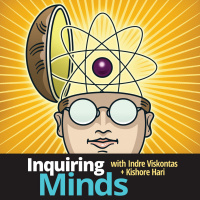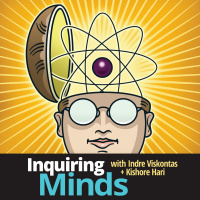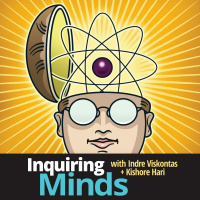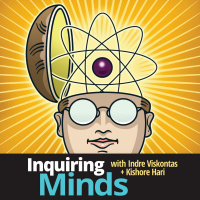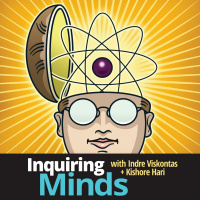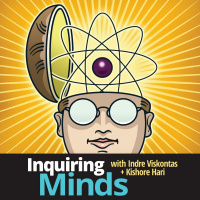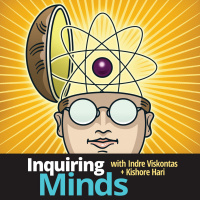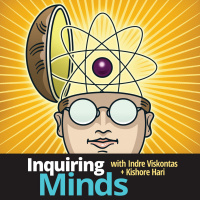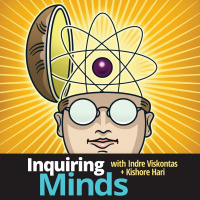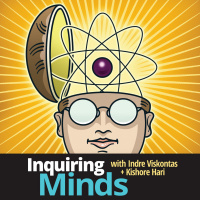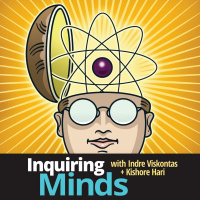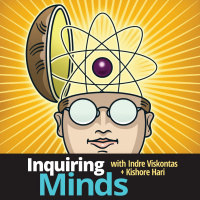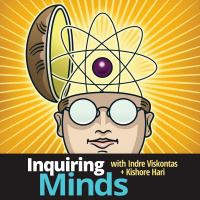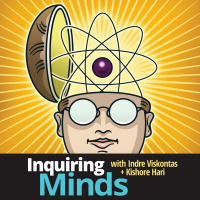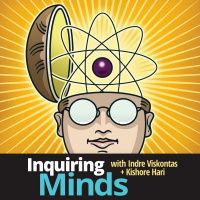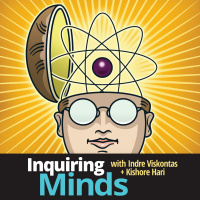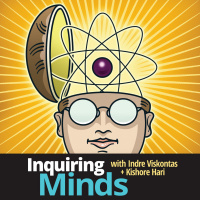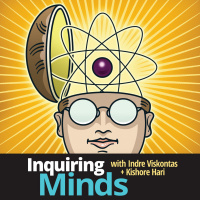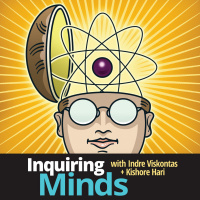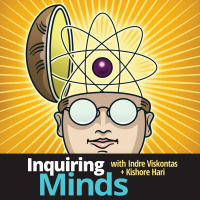Sinopsis
Each week Inquiring Minds brings you a new, in-depth exploration of the place where science, politics, and society collide. Were committed to the idea that making an effort to understand the world around you though science and critical thinking can benefit everyoneand lead to better decisions. We endeavor to find out whats true, whats left to discover, and why it all matters with weekly coverage of the latest headlines and probing discussions with leading scientists and thinkers. Produced in partnership with Climate Desk, a journalistic collaboration dedicated to exploring the impact of a changing climate and consisting of The Atlantic, Center for Investigative Reporting, Grist, The Guardian, Mother Jones, Slate, and Wired.
Episodios
-
121 Marah Hardt - Sex in the Sea
12/02/2016 Duración: 56minOn this special Valentine’s Day episode we talk to marine biologist Marah Hardt about 8-foot long whale penises, shark ejaculation systems, vagina mazes, fish orgies, and all the other crazy sex-stuff happening in our oceans. She’s the author of Sex in the Sea: Our Intimate Connection with Sex-Changing Fish, Romantic Lobsters, Kinky Squid, and Other Salty Erotica of the Deep.Support the show: https://www.patreon.com/inquiringminds
-
120 Eric Weiner - The Geography of Genius
05/02/2016 Duración: 58minOn the show this week we talk to bestselling author Eric Weiner about his latest book The Geography of Genius: A Search for the World's Most Creative Places from Ancient Athens to Silicon Valley.Support the show: https://www.patreon.com/inquiringminds
-
119 Kara Platoni - Hacking Human Perception
29/01/2016 Duración: 01h09minOn the show this week we talk to science reporter Kara Platoni about her new book We Have the Technology: How Biohackers, Foodies, Physicians, and Scientists Are Transforming Human Perception, One Sense at a Time.Support the show: https://www.patreon.com/inquiringminds
-
118 Kim Cobb - The Evolution of El Niño
22/01/2016 Duración: 44minOn the show this week we talk to climate scientist Kim Cobb about the science of El Niño and climate change—and how studying coral can help us understand both.Support the show: https://www.patreon.com/inquiringminds
-
117 Douglas Fields - The Science of Rage and Why We Snap
15/01/2016 Duración: 01h06minOn the show this week we talk to neurobiologist Douglas Fields about his new book Why We Snap: Understanding the Rage Circuit in Your Brain.Support the show: https://www.patreon.com/inquiringminds
-
116 Indre and Kishore’s 2016 Science Predictions
08/01/2016 Duración: 38minOn the show this week Indre and Kishore share their predictions for what some of the big science stories of 2016 will be.http://patreon.com/inquiringmindsSupport the show: https://www.patreon.com/inquiringminds
-
115 Chris Ferguson - Violence in Video Games
18/12/2015 Duración: 01h11minOn the show this week we return to the topic of violence in video games. We spoke to psychologist Chris Ferguson who offers a contrasting view on the subject.For more discussion, check out episodes 106 & 107.http://patreon.com/inquiringmindsSupport the show: https://www.patreon.com/inquiringminds
-
114 Mark Schatzker - The Dorito Effect
11/12/2015 Duración: 55minOn the show this week we talk to Mark Schatzker, author of The Dorito Effect: The Surprising New Truth About Food and Flavor, “a lively and important argument from an award-winning journalist proving that the key to reversing America’s health crisis lies in the overlooked link between nutrition and flavor.”http://patreon.com/inquiringmindsSupport the show: https://www.patreon.com/inquiringminds
-
113 Robert Sapolsky - Being Human
04/12/2015 Duración: 01h07minRobert Sapolsky is a MacArthur “Genius” Fellow, a professor of biology and neurology at Stanford University, and a research associate with the Institute of Primate Research at the National Museum of Kenya. We talked to Sapolsky about what it means to be human, what we humans can learn from other species, and why he—despite being a self-described pessimist—feels optimistic about our prospects as a species. This week’s episode was recorded live in San Francisco for the 2015 Bay Area Science Festival and was produced in collaboration with The Leakey Foundation and their podcast Origin Stories.http://leakeyfoundation.org/http://leakeyfoundation.org/originstorieshttp://patreon.com/inquiringmindsSupport the show: https://www.patreon.com/inquiringminds
-
112 Ed Lu - The Real Threat of Asteroids
27/11/2015 Duración: 57minEd Lu is a former astronaut and current CEO of the B612 Foundation. On the show this week we talked to him about the threat of asteroids hitting our planet—and what we can do about it.http://patreon.com/inquiringmindsSupport the show: https://www.patreon.com/inquiringminds
-
111 Steve Croft - The Feeding Habits of Supermassive Black Holes
20/11/2015 Duración: 43minOn the show this week we talk to UC Berkeley astronomy researcher Steve Croft about the science of supermassive black holes.http://patreon.com/inquiringmindsSupport the show: https://www.patreon.com/inquiringminds
-
110 Cady Coleman - Our Calling to Space
13/11/2015 Duración: 57minOn the show this week we talk to astronaut Dr. Cady Coleman about the human side of space exploration.“Leaving the planet is just something people are going to do because we live off the planet as well as on—we live in the universe.”http://patreon.com/inquiringmindsSupport the show: https://www.patreon.com/inquiringminds
-
109 Dava Newman - The Future of Space Exploration
06/11/2015 Duración: 43minDava Newman is the Deputy Administrator of NASA. On the show this week we talked to her about the future of space exploration.http://patreon.com/inquiringmindsSupport the show: https://www.patreon.com/inquiringminds
-
108 Adam Galinsky & Maurice Schweitzer - The Science of Sex, Power, and Competition
30/10/2015 Duración: 49minOn the show this week we talk to Adam Galinsky and Maurice Schweitzer about the research behind their new book Friend & Foe: When to Cooperate, When to Compete, and How to Succeed at Both. “A lot of what we call gender differences are really just power differences in disguise. The big irony is that women and men get affected by power in very similar ways yet because women have less power in society, there’s a constraint on their ability to act with that power.”http://patreon.com/inquiringmindsSupport the show: https://www.patreon.com/inquiringminds
-
107 Ariel Waldman - Hacking Science
25/10/2015 Duración: 57minAriel Waldman makes “massively multiplayer science”, instigating unusual collaborations that spark clever creations for science and space exploration.On the show this week we talk to her about Science Hack Day, Spacehack.org, how she ended up working for NASA, and much more.This episode also features a follow-up interview with last week’s guest Brad Bushman on video games and violence.http://patreon.com/inquiringmindsSupport the show: https://www.patreon.com/inquiringminds
-
106 Brad Bushman - The Science of Gun Violence
16/10/2015 Duración: 52minOn the show this week we talk to psychologist Brad Bushman about the science of gun violence. Brad Bushman is a professor of communication and psychology at The Ohio State University and a professor of communication science at the VU University Amsterdam. For over 25 years he has studied the causes, consequences, and solutions to the problem of human aggression and violence. He is a member of President Obama’s committee on gun violence, and has testified before the U.S. Congress on the topic of youth violence.http://patreon.com/inquiringmindsSupport the show: https://www.patreon.com/inquiringminds
-
105 Brad Voytek - We Neuroscientists Don't Really Know What Your Brain Is Doing
09/10/2015 Duración: 59minThe website for neuroscientist Brad Voytek’s lab begins like this: “Do not buy into the false belief that neuroscientists actually know what the brain is doing.” On the show this week we talked to Voytek to find out what he actually means by that.Brad Voytek is an Assistant Professor of Computational Cognitive Science and Neuroscience at UC San Diego.Support the show: https://www.patreon.com/inquiringminds
-
104 Justin Rubinstein - Humans Are Causing Earthquakes in Oklahoma
02/10/2015 Duración: 41minIn 2014 there were 585 magnitude three or above earthquakes in Oklahoma. In 2013 that number was only 109. And it turns out we’re to blame for the increase.On the show this week we talk to Research Geophysicist and Deputy Chief of the USGS Induced Seismicity Project Justin Rubinstein to find out more about induced earthquakes—and why they’re happening in places you might not expect.Support the show: https://www.patreon.com/inquiringminds
-
103 M. R. O'Connor - Resurrection Science and the Precarious Future of Wild Things
25/09/2015 Duración: 58minOn the show this week we talk to M. R. O'Connor about her book Resurrection Science: Conservation, De-Extinction and the Precarious Future of Wild Things.Support the show: https://www.patreon.com/inquiringminds
-
102 Beth Shapiro - The Science of De-Extinction
18/09/2015 Duración: 58minHow do you clone a mammoth? We asked Beth Shapiro. Shapiro is associate professor of ecology and evolutionary biology at the University of California, Santa Cruz and the author of How to Clone a Mammoth: The Science of De-Extinction.Support the show: https://www.patreon.com/inquiringminds

